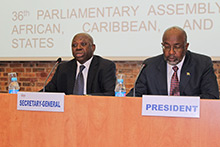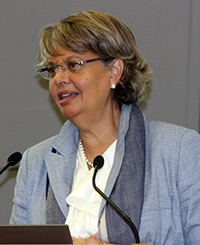Future role of ACP Group interrogated by Parliamentary Assembly
 Strasbourg, 28 November 2014/ ACP: Debates on determining the future orientation of the ACP Group as an international organisation evoked strong yet mixed reactions from lawmakers from across the ACP regions.
Strasbourg, 28 November 2014/ ACP: Debates on determining the future orientation of the ACP Group as an international organisation evoked strong yet mixed reactions from lawmakers from across the ACP regions.
At the 26th session of the ACP Parliamentary Assembly held in Strasbourg, the ACP Secretary General H.E Alhaji Muhammad Mumuni framed the debate by highlighting the upcoming Council of Ministers meeting in Brussels on 9-12 December. The governing body will hear submissions from two critical panels on how to reform the organisation to better fit the needs of member states in the 21st century.
“The forefathers of our Group… in 1975, had this twin objective in mind: to bridge the development gap in ACP states and secondly, through this process to integrate them and make them more effective players in the international economy,” said the Secretary General.
“One could perhaps express disappointment that after 40 years of our existence, we should still be talking about the same objectives.” Read the full speech here
Hon. Netty Baldeh of the Gambia agreed that while ACP countries had rich resources, they need to “stop being markets” to other powerful players. The representative from Chad added that a lack of international expertise meant that ACP countries keep signing deals that do not benefit them in the long run, such as those involving petrol and natural resources.
Meanwhile Kenyan MP Hon. Joyce Laboso asked about the usefulness of ACP political meetings in actually addressing these issues on the ground.
EPG vision
Later in the session, Ms. Patricia Francis, Chair of the Drafting Committee of the ACP Eminent Persons Group (EPG) – a 12 member panel of distinguished personalities chosen to review the ACP Group and make recommendations for reforms –presented the EPG’s “vision” for the organisation for discussion.
Ambitions included streamlining the organisation to focus on three pillars: Trade and Investment; Development Cooperation; and Political Dialogue an Advocacy. The EPG also proposed to streamline the ACP Secretariat, reform governance in the organisation, and diversify cooperation by negotiating a new post-2020 framework for ACP-EU cooperation while also developing relations with other partners.
Amongst the many reactions to the presentation, the leader of the National Assembly of Belize Hon. Michael Peyrefitte warned against “pipe dreams” and called for more unity amongst ACP countries themselves as a priority. The representatives from the Democratic Republic of Congo as well as Chad also urged more emphasis on intra-ACP cooperation and regionalization.
Others highlighted industrialization, peace and security as well as climate change, as issues that need due attention in the new set up. The MPs’ underlined their desire to see concrete and realistic recommendations that addressed fundamental operational questions of the Group.
Ms. Francis concluded that it was necessary for ACP countries to manage their own future, including the most beneficial use of its abundant resources, before other bodies do it for them. She reiterated the need for radical reform of the institution in order to be more effective.
(Photo: ACP Secretary General H.E Alhaji Muhammad Mumuni and Chair of the ACP Parliamentary Assembly Hon. Fitz Jackson; Chair of the EPG Drafting Committee Mme. Patricia R. Francis)
– ACP Press
